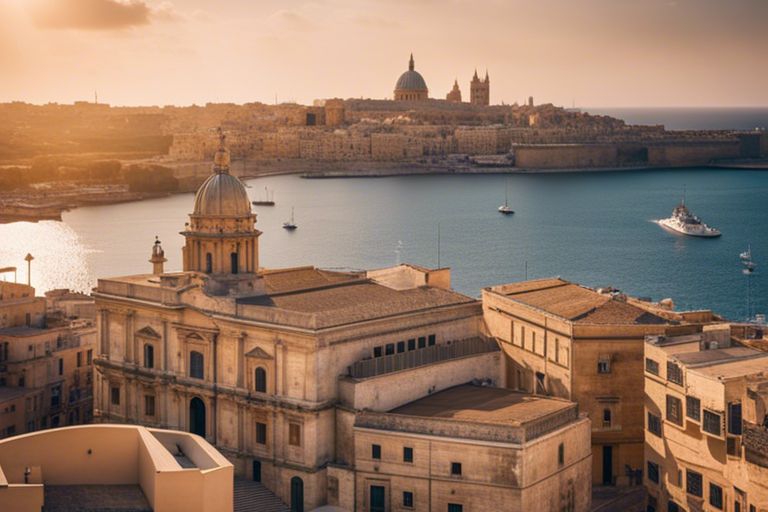10 Must-Know Facts About Malta’s Economy

Small but Dynamic
Your journey into understanding Malta’s economy starts with grasping the concept that it may be small in size, but it’s definitely mighty in its dynamism. This tiny Mediterranean country has truly carved out a unique space for itself on the global economic stage.
One of the most important facts to know about Malta’s economy is its remarkable resilience. Despite its size, Malta has managed to diversify its economy effectively, reducing its dependence on any single sector. This diversification has played a crucial role in ensuring stability and growth, even in the face of economic uncertainties.
However, it’s important to note that Malta faces challenges as well. Its small size means that it is particularly vulnerable to external shocks, such as changes in international trade dynamics or economic downturns in key partner countries. This vulnerability underscores the need for continued vigilance and strategic economic planning.
On a more positive note, Malta’s economy has shown impressive growth rates in recent years, outpacing many larger European economies. This growth has been driven by key sectors such as tourism, financial services, and manufacturing, all of which have flourished thanks to Malta’s strategic location, skilled workforce, and business-friendly policies.
In summation, while Malta may be small in size, its economy is anything but stagnant. With its resilience, growth potential, and strategic advantages, Malta continues to punch above its weight on the global economic stage.
Service-based Economy
Tourism-driven
For a small island nation like Malta, tourism plays a crucial role in driving its service-based economy. With its beautiful Mediterranean climate, historic sites, and stunning beaches, Malta attracts millions of tourists each year. This sector contributes significantly to the country’s GDP and employment rates.
Financial Services
If you investigate deeper into Malta’s service-based economy, you’ll discover the significant role played by the financial services sector. Malta has positioned itself as a hub for financial services, offering a range of services such as banking, insurance, and investment funds.
Financial services in Malta are regulated by the Malta Financial Services Authority (MFSA), ensuring compliance with international standards. The sector has attracted many international companies seeking a stable and well-regulated financial jurisdiction within the EU.
Advanced Manufacturing
If you are interested in understanding the Maltese economy, delving into advanced manufacturing is crucial. This sector plays a significant role in driving the nation’s economic growth and development.
- High-tech Productions
Key Point Detail Innovation Malta’s advanced manufacturing sector is known for its innovative technologies and practices. Skills The sector requires highly skilled workers to operate advanced machinery and systems effectively. - Export-oriented
Key Point Detail International Markets Companies in Malta’s advanced manufacturing sector are focused on exporting their products to international markets. Competitive Advantage Malta’s strategic location and skilled workforce give companies a competitive edge in global trade.
High-tech Productions
An vital aspect of Malta’s advanced manufacturing sector is its focus on high-tech productions. The industry thrives on innovation, leveraging cutting-edge technologies to drive production processes. Skilled workers are trained to operate sophisticated machinery, ensuring efficient and precise manufacturing operations.
Export-oriented
There’s a strong emphasis on export-oriented strategies within Malta’s advanced manufacturing sector. Companies actively target international markets to expand their reach and increase revenue streams. By tapping into global markets, Maltese manufacturers can showcase their high-quality products and services to a broader audience, enhancing the country’s reputation as a reliable trade partner.
Gaming Industry
Online Sector
Some amazing facts about Malta’s economy include its booming gaming industry, known for its vibrant online sector. The online gaming industry has experienced significant growth in Malta, attracting numerous international companies to set up operations in the country.
Regulatory Framework
Some key highlights about Malta’s gaming industry pertain to its robust regulatory framework. The Malta Gaming Authority (MGA) regulates all gaming activities in the country, ensuring that operators comply with stringent rules and standards to protect consumers and maintain the integrity of the industry.
Gaming regulations in Malta are considered to be among the most comprehensive and stringent in the world. Compliance with these regulations is important for operators to operate legally and maintain a reputable image in the industry. The MGA continuously updates its regulatory framework to adapt to the evolving gaming landscape and address emerging challenges such as responsible gaming and anti-money laundering efforts.
You can rest assured that Malta’s gaming industry operates in a secure and transparent environment, offering a level of consumer protection that is unparalleled in many other jurisdictions. With a strong emphasis on regulatory compliance and industry best practices, Malta has established itself as a leading hub for online gaming companies looking to thrive in a regulated market.
EU Membership Advantage
Eurozone Inclusion
Despite its small size, Malta’s economy has greatly benefited from its membership in the European Union. The country adopted the Euro as its currency in 2008, which brought stability to its economy and facilitated trade within the Eurozone.
Market Access
To further bolster its economy, Malta’s EU membership provides businesses with unparalleled access to the single market, consisting of over 500 million consumers. This has attracted foreign investments and encouraged local businesses to expand their operations.
For instance, Maltese companies can easily export their products and services to other EU countries without facing tariffs or barriers. This has opened up new opportunities for growth and has helped Malta establish itself as a thriving business hub in the Mediterranean region.
Limited Natural Resources
All economies around the world rely on natural resources to some extent, and the same goes for Malta. This small archipelago in the Mediterranean Sea faces challenges due to its limited natural resources.
Energy Import Reliant
Some of the biggest challenges Malta faces in its economy are related to energy. The country is heavily reliant on energy imports, making it vulnerable to price fluctuations and supply chain disruptions. Relying on imported energy sources puts pressure on the economy and hinders its long-term sustainability goals.
Water Scarcity
Some may not realize that water scarcity is a pressing issue in Malta. The country lacks natural freshwater sources and heavily relies on desalination plants for its water supply. With a growing population and increasing demand, managing water scarcity is becoming more critical for Malta’s sustainable development.
Now, efforts are being made to promote water conservation and explore alternative water sources to alleviate the stress on the limited water supply. Investment in technology and infrastructure plays a crucial role in addressing the water scarcity challenge in Malta.
Reliant on imported energy and facing water scarcity, Malta’s economy is working towards greater sustainability and resilience. The focus on alternative energy sources and water management strategies will be key in securing Malta’s future economic stability.
Stable Unemployment Rates
Low Joblessness
On the list of ten must-know facts about Malta’s economy is the stable unemployment rates in the country. Malta has consistently maintained a low joblessness percentage compared to other European countries. This is a positive sign of a resilient economy that provides opportunities for its workforce.
Skilled Workforce
Clearly, a key contributing factor to Malta’s stable unemployment rates is its highly skilled workforce. Maltese workers are known for their expertise in various industries ranging from technology to tourism. This skilled workforce plays a crucial role in attracting businesses and investments to the country, further boosting its economy.
Stable economic growth has been observed in Malta due to its highly skilled workforce. The government’s focus on education and training programs has helped in creating a pool of talented professionals that contribute to the country’s economic stability. Additionally, the adaptability of the Maltese workforce to changing market demands has been a key strength in maintaining low unemployment rates.
Innovative Energy Projects
Unlike its size, Malta has always been a pioneer in innovative energy projects, setting the pace for sustainability in the region.
LNG Power
Some of the most significant strides in Malta’s energy sector have been made through the implementation of LNG power projects. These projects have not only reduced dependency on imported fossil fuels but have also significantly lowered carbon emissions.
Renewable Ventures
Projects focusing on renewable energy ventures have been booming in Malta. These initiatives aim to harness solar and wind energy to power the nation sustainably. With a strong focus on renewable ventures, Malta is on the right path toward achieving its energy sustainability goals.
Plus, the government’s support and incentives for renewable energy projects have encouraged both local and international investors to participate in Malta’s green energy initiatives.
Strategic Geographic Position
To understand Malta’s economy, one must first look at its strategic geographic position. Located in the heart of the Mediterranean Sea, Malta serves as a gateway between Europe, Africa, and the Middle East, making it a key player in regional trade and commerce.
Mediterranean Hub
To highlight this geographic advantage, Malta has positioned itself as a Mediterranean hub for businesses looking to access markets in the region. The island’s convenient location and well-developed infrastructure make it an attractive choice for companies seeking to establish a presence in this bustling economic zone.
Shipping Activities
Activities
Geographic The strategic position of Malta has also made it a thriving center for shipping activities. The island’s natural harbors and modern ports have turned it into a crucial transshipment point for goods moving between Europe, Africa, and Asia. Plus, Malta’s status as a flag of convenience state has further boosted its shipping industry, attracting numerous international vessels to register under the Maltese flag for various benefits.
Government Initiatives
Once again, the Maltese government has shown its commitment to fostering a strong and vibrant economy through various initiatives and programs.
Business Incentives
Initiatives like tax incentives, grants, and support for startups have made Malta an attractive destination for businesses looking to establish or expand their operations. The government actively promotes entrepreneurship and innovation, creating a conducive environment for business growth.
Economic Growth
Some government initiatives include infrastructure development projects, investment in key sectors like technology and tourism, and efforts to attract foreign direct investment. These measures have paved the way for sustained economic growth and prosperity in Malta.
Government efforts to streamline bureaucracy and improve the business environment have also contributed to Malta’s economic success. By fostering a business-friendly atmosphere and encouraging innovation, the government is driving forward economic growth and development in the country.
FAQs:
How has Malta managed to diversify its economy despite its small size?
Malta has strategically diversified its economy across multiple sectors such as tourism, financial services, and manufacturing, reducing reliance on any single sector for stability and growth.
What are the challenges faced by Malta’s economy due to its small size?
Malta’s small size makes it vulnerable to external shocks like changes in international trade dynamics or economic downturns in key partner countries, emphasizing the need for continuous vigilance and strategic economic planning.
What regulatory body oversees Malta’s gaming industry?
The Malta Gaming Authority (MGA) regulates all gaming activities in Malta, ensuring compliance with stringent rules and standards to protect consumers and maintain industry integrity.
How does Malta address its challenges related to energy and water scarcity?
Malta is investing in alternative energy sources and water management strategies to mitigate its reliance on imported energy and address water scarcity issues, promoting sustainability and resilience in its economy.
What initiatives has the Maltese government implemented to support economic growth?
The Maltese government offers various incentives such as tax incentives, grants, and support for startups, along with infrastructure development projects and efforts to attract foreign direct investment, fostering a conducive environment for business growth and economic prosperity.
Recommended Posts

Discover iGaming Opportunities in Malta
July 26, 2024

Financial Aspects of Doing Business in Malta
July 26, 2024

The Rise of Digital Banking Solutions in Malta
July 24, 2024




